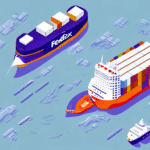Exploring the Ports Used by FedEx Ship Manager
Efficient shipping relies heavily on the strategic selection of ports. This article explores how FedEx Ship Manager selects its ports, the types of ports utilized, and the challenges encountered in port management.
The Significance of Ports for FedEx Ship Manager
Ports are pivotal in the shipping industry, acting as major hubs for transferring goods between various transportation modes. For FedEx Ship Manager, selecting the appropriate port is essential to ensure timely and cost-effective delivery of shipments worldwide.
When choosing a port, FedEx Ship Manager evaluates several factors:
- Location: Determines the distance and transit time to the final destination.
- Infrastructure: Includes cranes, storage facilities, and transportation links that facilitate efficient handling.
- Capacity: Assesses the port's ability to handle the volume of shipments without delays.
By meticulously analyzing these aspects, FedEx Ship Manager optimizes shipment delivery times and minimizes costs, enhancing overall operational efficiency.
The Role of Ports in the Shipping Industry
Ports are integral to the logistics chain, offering a suite of services to shipping companies such as container storage, loading and unloading, and customs clearance. They also provide critical access to road, rail, and air transportation, making them essential nodes in the transportation network.
Moreover, ports significantly impact the global economy by enabling international trade. They serve as gateways for imports and exports, connecting businesses and consumers globally. The efficiency of port operations can greatly influence a country's competitiveness in the global market.
Port Selection Criteria for FedEx Ship Manager
FedEx Ship Manager employs a comprehensive set of criteria when selecting ports:
- Size and Capacity: Ability to handle various cargo types and volume.
- Geographical Location: Proximity to origins and destinations to reduce transit times.
- Equipment Availability: Access to necessary tools and machinery for efficient cargo handling.
- Service Quality: Reliability and efficiency of port services.
- Environmental Considerations: Potential weather or environmental hazards that could disrupt operations.
These criteria ensure that FedEx Ship Manager selects ports that enhance operational reliability and cost-effectiveness.
Advantages of Selected Ports by FedEx Ship Manager
FedEx Ship Manager utilizes a diverse portfolio of ports, each offering unique benefits:
- Rotterdam, Netherlands: Access to extensive transportation networks across Europe.
- Busan, South Korea: Strategic location for serving the Asia-Pacific market.
- Dubai, UAE: Gateway to Middle Eastern markets with advanced logistics infrastructure.
- Hong Kong, China: Key hub for international trade with robust facilities.
Additionally, specialized ports like Hamburg and Shanghai offer state-of-the-art container terminals, while ports such as Singapore and Los Angeles have dedicated facilities for perishable goods, essential for industries like food and pharmaceuticals.
The Impact of Port Selection on Shipping Costs
Choosing the right port directly influences shipping costs by affecting the transportation route and delivery time. Key factors include:
- Type of Cargo: Perishable goods require ports with refrigeration facilities.
- Destination Accessibility: Ports with robust rail or road connections reduce transportation costs.
- Shipping Schedule: Efficient port operations minimize delays and associated costs.
Moreover, selecting ports closer to final destinations can lower transportation distances and emissions, aligning with sustainability goals and reducing the carbon footprint.
Types of Ports Utilized by FedEx Ship Manager
FedEx Ship Manager employs various types of ports based on shipment requirements:
- Container Ports: Handle standardized shipping containers, ideal for diverse cargo.
- Bulk Ports: Manage loose materials such as coal or grain.
- Roll-on/Roll-off (RoRo) Ports: Facilitate the transport of vehicles by allowing them to be driven onto ships.
- Specialized Ports: Include refrigerated ports for perishables and hazardous material ports for dangerous goods.
Managing Changes in Port Availability
FedEx Ship Manager has robust contingency plans to address changes in port availability:
- Rerouting Shipments: Redirecting to alternative ports to maintain delivery schedules.
- Alternative Transportation Modes: Utilizing different logistics methods to ensure timely delivery.
- 24/7 Monitoring: A dedicated team continuously monitors port conditions to proactively address potential disruptions.
- Expedited Shipping Options: Offering faster shipping services for time-sensitive shipments.
Challenges in Port Management and Solutions
FedEx Ship Manager faces several challenges in port management, including:
- Port Congestion: Leads to delays and increased costs. Solution: Utilizing advanced logistics tools to optimize shipping routes and reduce congestion risks.
- Regulatory Compliance: Navigating varying regulations across different ports. Solution: Maintaining a dedicated compliance team and investing in employee training to ensure adherence to all regulations.
Future Trends in Port Utilization by Shipping Companies
Looking ahead, shipping companies like FedEx are expected to adopt advanced technologies to enhance port utilization:
- Automation and Artificial Intelligence: Streamlining port operations and improving efficiency.
- Sustainable Practices: Implementing renewable energy sources and reducing carbon emissions to meet environmental goals.
- Data Analytics: Leveraging data for better decision-making and supply chain visibility.
Choosing the Right Port for Your Shipping Business: Lessons from FedEx
Businesses aiming to select the optimal port can learn from FedEx's approach:
- Evaluate Location and Accessibility: Proximity to markets and transportation networks.
- Assess Port Capacity and Infrastructure: Ensure the port can handle your cargo volume and has the necessary facilities.
- Consider Regulatory Environment: Understand the compliance requirements of the port.
- Analyze Competition Levels: High competition ports may offer better prices but may also experience congestion.
Balancing these factors can lead to more efficient and cost-effective shipping operations.
The Role of Technology in Optimizing Port Management
Technology plays a crucial role in enhancing port management for shipping companies like FedEx:
- Automated Container Terminals: Utilize robotics and AI to handle containers, reducing manual labor and increasing efficiency.
- Real-Time Tracking: Improves supply chain visibility and minimizes the risk of lost or delayed shipments.
- Data Analytics: Enables better decision-making and optimization of port operations.
By integrating these technologies, FedEx Ship Manager enhances operational efficiency and delivers a superior customer experience.
Conclusion
The selection of ports is a critical component of shipping operations for companies like FedEx. By strategically choosing ports based on location, capacity, infrastructure, and regulatory factors, FedEx Ship Manager ensures timely and cost-effective delivery of shipments. Embracing emerging technologies and sustainable practices will continue to shape the future of port utilization, driving efficiency and competitiveness in the global shipping industry.
Factors such as cargo type, geographical location, and proximity to transportation hubs further influence port selection, enabling businesses to optimize their logistics and reduce costs. As the shipping industry evolves, the role of ports will remain central to facilitating international trade and economic growth.






















